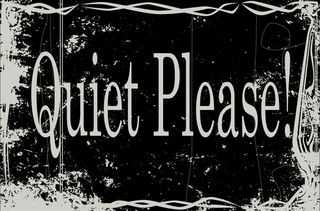Misophonia
What Jeffrey S. Gould Can Teach Us about Misophonia
His film Quiet Please inspires resilience and hope in sufferers of misophonia.
Posted January 27, 2016

It’s not found on spell check. It’s only recently gained the attention of neuroscientists, audiologists, and the occasional psychologist. It isn’t listed in the DSM-V yet, and though it onsets in childhood, many pediatricians are unaware it exists.
Because it isn’t talked about commonly, many of its sufferers don’t know they have it. They know only that they’ve been suffering with extreme sensitivity to specific sounds that make them feel terribly misunderstood.
Those suffering with this condition have experienced their sympathetic nervous systems jumping into high gear with great rapidity. They’ve likely experienced the startling jolt which takes one from a relaxed state into the fight-flight-freeze mode in milliseconds. Specific noises appear to elicit a reflexive aversive response, commonly experienced as instantaneous disgust, anger, and rage. Over time, their own strong reactions have the potential to lead to challenges interpersonally. The chronic nature of the distress can lead some into a sense of helplessness, preoccupation, isolation, avoidance, fearfulness, aggressive outbursts, and despair.
Sufferers of this condition, misophonia, are about to learn that they’re not alone.
Jeffrey S. Gould is no stranger to misophonia, a recently identified disorder of the auditory central nervous system that causes extreme sensitivity to everyday sounds (such as chewing, sniffling, typing, tapping, and more).*
Below is my interview with Jeffrey S. Gould:
1. What inspired you to create your film about misophonia?
I recall my very first “run in” with a sound; it was 48 years ago in a classroom during a test and the kid behind me didn’t stop sniffling the entire time. I kept turning around, so that maybe he would notice how annoying he was...but of course he hadn’t a clue. Over the next 45 years, I met a handful of people, who like me, didn’t like chewing sounds, and one woman who wouldn’t go to the movies because of crunching popcorn and wrappers rustling. Meeting that last woman initiated a revelation for me, because it was then that I realized “I can’t be the only who reacts this way.” However, I still thought it was a personality quirk or perhaps we all had super hearing. Fast forward to 5/19/2012 when a friend called me and said “I saw a segment on 20/20 last night and there’s a name for what you have, it’s called Misophonia and it means Hatred of Sound”. That day was a turning point in my life, because it’s the day I went from feeling crazy and intolerant, to a feeling of validation that my reactions were part of something way bigger than what I perceived to be an annoyance.
Once I had this name, I found videos of people talking about their experiences and it was like they were speaking my words...cathartic is the only word that could explain the feeling. That’s where the seed was planted to do a documentary about the emotional and psychological impact that misophonia has on a person’s life, relationships and even their careers. On December 13, 2014, I was having lunch with a friend and she asked me “so what do you want to do with the rest of your life?” and I said “do a documentary”, she said “on what?” and I said “I’m only passionate about two subjects: misophonia and chocolate”. The following week I started research on my misophonia documentary. On February 13th, I asked the Facebook communities if they would find value in a documentary on misophonia and I received over 500 likes in 24 hours, and I haven’t looked back since.
2. Who did you interview (generally)?
My goal was always to show that no one is exempt from having misophonia, it affects people of all ethnicities, ages and walks of life. I spent months on the forums looking for people who were passionate about getting the word out, and also who had interesting professions, as well as those who went on to have great careers and success. I interviewed a total of 40 people in 10 states, ages 7 to 62, and also commissioned a cinematographer to film a businessman in Germany.
3. What major lesson(s) can all people learn by watching your film?
I feel Quiet Please... has 4 audiences: people with misophonia, people who live with people who have misophonia, people who have it, but think they’re alone in their plight, as well as the doubters; the people who think we’re making this up, in an effort to be controlling. The lessons in the film go way beyond misophonia, I believe there are life lessons: compassion, understanding, acceptance, compromise, and tolerance. Of course, none of these will make misophonia go away, but based on my own experiences and listening to 40 people tell their stories...it certainly does help lighten the load. I also believe that those with misophonia need to be tolerant to the people around us as well...but it’s very hard to control a condition that is not controlled by thought; it’s controlled by an autonomic system called Freeze/Fight/Flight.
4. What do you think is missing in our world, in terms of helping people with this condition?
I often think of “what could people do to make life easier for us?” and it’s also one of the questions I ask my subjects for the film; most people respond “just cut us some slack”, “please realize we can’t control our reactions, we don’t want to be this way” and lastly “we’re not asking you to stop living your life”.
Before any change could be expected, I feel we need to educate the people who are a part of our everyday lives, because honestly, how could we expect strangers to accommodate our bizarre condition, when we don’t even understand it ourselves. Education was actually the impetus for this film; I realized that by explaining my sensitivity for certain sounds, perhaps they would be willing to make an effort to be mindful in certain situations, and to also understand, that I might have to say “excuse me” for a few, while I retreat to a quiet space to recharge, before being able to socialize once again.
To my surprise, I found people to be very understanding and most wanted to learn more. Let’s face it, people can be cruel, especially when they can hide behind the internet; I’m blown away by the things that people have said in public forums about misophonia: “perhaps you should puncture your ear drums so you can be deaf”, “why don’t you kill yourself, so we don’t have to hear about your control issues?” Those are actual comments on the trailer’s YouTube page. So...my job with the film is to show the world that this a real condition affecting tens of thousands of people and their families.
To do that, I’ve included Audiologists, Psychologists and Neuroscientists, including Joseph LeDoux, PhD, number 6 in a list of the top 30 Neuroscientists in the world. If people are open even to the possibility that this could be a valid condition and that our responses are beyond our control, perhaps they would be a little more mindful of their noises and sound level. I realize that there are compassionate people in the word and there are people who are self-absorbed...I’m hoping that I can tap into the people who are compassionate and who are, at least willing to hear us out.
5.What do you see emerging, that can give people with this condition hope?
The fact there have been articles and news segments on misophonia on a somewhat regular basis in 2015, is a step forward; however, most of these articles contain misinformation, are skewed and one-sided and even contain damaging medical advice. There are several people working behind the scenes to organize research with leading institutions and the seed has been planted. I do think we’re a long way off from an actual cure, but there are treatment providers who are claiming that they have treatments that have cured or lessened the effects of misophonia. I decided to not make this film about treatment but to concentrate on the effects of the condition; with the hope that the people who have the funding and knowledge to do research, will see that there is a true need and that misophonia sufferers have a condition that makes them intolerant of noxious sounds, not the other way around.
6. Would you be willing to teach us 3 of your own strategies for living a healthy and full life with this condition?
A very over-used term “knowledge is power” applies here and it’s the best advice I can give anyone who is suffering with misophonia or who is in a relationship with someone who has the condition. For me, knowing I wasn’t alone, was life-changing and I read the same thing every day, with every new person who finds one of the many misophonia support groups...so I think it has to start there. Once you feel confident that you could explain it to your loved ones or co-workers, then hopefully you will be surrounded by people who support you.
I also feel it’s important to know your limitations, if you know a certain people are loud, make wise choices based on your ability to cope on that particular day and sometimes that means saying "no". So to reiterate, the two strategies I use in my life are education/awareness and protecting myself. I respect myself enough to say “sorry, I just can’t subject myself to that environment right now”, if they are true friends, they’ll understand.

7. Where can people go to donate money to help support the film?
While the film met its crowd-sourcing goals in only two weeks and continues to receive contributions, additional funding would help in several ways: film festivals, medical animations to support the neuroscientists, closed-captioning, licensing fees for opportunities that arose during the filming and many more unexpected expenses that will come with trying to obtain distribution. Here’s the IndieGoGo campaign link: http://igg.me/at/QuietPlease and here’s the film’s website where you can always get the latest updates: www.quietpleasefilm.com
*The author wishes to acknowledge and thank Jeffrey S. Gould for this interview, and encourages readers to visit his site and learn more about his excellent work.
If you think your child may have this condition, please visit my blog 7 Warning Signs that Your Child Might Have Misophonia.




